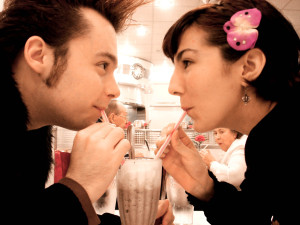(This is part 4 in my series, “What I Want My Teenage Daughters to Know about Sex.” Click here to read it from the beginning.)
In the words of psychologist David Ley, “many of our beliefs about sexuality have been based on myths and subjective fears.”
Indeed, numerous myths about sex and relationships persistently circulate in religion and pop culture, and you’ve been exposed to both.
Here are some of the more significant myths that I’ve culled from my research. Unfortunately, it’s a very long list. I apologize for that, but I didn’t make up these myths; I’m just answering them. I’ve divided this list up into two parts. Next week, I’ll run part 2. Today, I want to start with this interesting tidbit, which almost sounds plausible…
Myth: “You don’t actually need sex.”
Well, then, that explains why so many marriages split up over sex issues. Uh. Or maybe it doesn’t.
Truth: Most humans are sexual beings and have a built-in sex drive.
We all need sex, and we all need the benefits that sex brings, whether we get them through healthy sex and relationships, or whether through dysfunctional behaviors. We all need attention, intimacy, and love. We all need the variety and discovery of accomplishment, and sex helps provide these, too. Sex is even involved in our sense of status and sense of purpose.
Myth: “Sex won’t make you happy.”
I swear, I actually saw this in a Christian book about dating, targeted at teens.
Truth: It depends.
We tend to get very unhappy when our basic human needs are not met. Sex is involved in meeting many of these needs, as I just pointed out. Therefore, sex actually is involved in your happiness. And since one of our needs is sex itself, if you’re not getting enough of it, getting more sex could indeed make you happier than if you didn’t.
Myth: “Men only want one thing.”
Truth: It’s way more complicated than that.
Some men indeed only want one thing. And so do some women. But men are told that it’s normal for them to want a lot of sex, and women are told it’s slutty for them. In fact, most men and women (both!) are interested in meeting a wide range of physical and emotional needs (as I mentioned above), and sex is only a part of how they do that.
For the record, when I was a teenager, when I was attracted to a girl, sex was the last thing on my mind. Yes, I had sexual thoughts, but not about girls I actually liked. With them, it was more about romance, affection, and attention. The sex always came after all that.
Myth: “Women don’t have a sex drive and don’t enjoy sex.”
The flip-side of the old chestnut above.
Truth: The female sex drive is at least as powerful as the male’s.
Again, girls are told that for them to want sex makes them a slut, but for a guy to want sex makes him a stud. (See also Laci Green’s commentary, “Why I’m a Feminist”.)
But women definitely want sex. And definitely enjoy sex. In Polynesian culture, it is a point of pride for the man to make sure that the woman has at least as many orgasms as he. Polynesian women are the same as women everywhere, except that they’re actually respected for their sex drive. May all men learn how to be Polynesian.
Or at least how to please a woman. There are a number of good, informative videos and books. When you’re ready, ask, and I’ll give you some titles.
Myth: “Oral sex isn’t really sex.”
Truth: Oral sex is definitely a kind of sex.
True, oral sex can’t get you pregnant. But many STI’s can spread orally: syphilis, gonorrhea, herpes, HPV, internal parasites, hepatitis A, and HIV. Therefore, even with oral sex, use condoms and dental dams. (There are even flavored condoms designed for oral sex.)
(Note that some STI’s can also spread through touching with the fingers. Make sure you have no cuts on your hands, and wash your hands before and after touching your partner and before touching yourself. Or use disposable latex or polyurethane gloves.)
But it’s not just about STI’s. In a survey by the Guttmacher Institute, half of college students said oral sex is at least as intimate as PiV sex.
Sex is sex. Own up to it.
Myth: “Having sex during your period will increase your risk of vaginal infection and cervical cancer.”
I got this one from a Jewish website that was desperately grasping for sciencey-sounding reasons for Jewish religious purity laws.
Truth: Not really, not if you use basic sanitary practices.
It it true that the cervix opens during your period, to let blood flow through, and that this also can let infection through. And it is also true that the vagina is less acidic during your period, which allows more infections. However, with basic sanitary practices, sex during a woman’s period is still safe. Remember the general rule: Never put anything in your vagina that’s not clean enough to put in your mouth. (Really.) And if you really want to make sure, use a condom.
If you or your partner want to avoid sex during your period, either for religious reasons or for personal reasons, that’s of course just fine. But don’t do it for medical or safety reasons, because they just don’t exist. Your period is not dirty or unsafe.
Myth: “Abstinence is the best protection against getting pregnant or catching an STI.”
Truth: Or you could also just use a condom.
In the words of Penn Jillette, “But that’s like avoiding getting hit by a car by staying at home— all the time.” To me, that sounds a little agoraphobic. You can get treated for that, you know. It doesn’t sound like a very pleasant way to live, in any case.
So yeah, I guess abstinence is a sure-fire way to avoid getting pregnant. But most people don’t want to abstain. Most people really need not to abstain, at least at some point in their lives. Even religious folk who wait until they get married, after they get married they don’t practice abstinence as a form of birth control.
Myth: “Virginity is a special gift that you can give only once, to one special person.”
Truth: Only a special person would love you enough to accept such a crummy gift without complaining about it.
Thank God you can only give it once, because the first time you have sex is likely to be one of the clumsiest, most anticlimactic quests you’ve ever embarked upon. You won’t know what the hell you’re doing. Don’t get me wrong, the first time is still intimate and emotionally significant. But only after decades, after you’ve been studying, experimenting, discovering, learning, only then will sex become truly great.
So enjoy the journey. Just do so responsibly.
Myth: “If you abstain, then your first time will be amazing, intimate, emotional, beautiful.”
Actual words used by some young virgins on a documentary about abstinence.
Truth: It’ll be pretty boring, because you won’t know what the hell you’re doing.
Having great sex is a skill, like playing the guitar. You have to practice a lot before you get good at it. And you have to practice with the same partner to get good at understanding what he feels and what he likes, because everyone is a little different from everyone else. After you’ve been having sex with the same person for years, then it’ll finally start to get amazing, intimate, emotional, beautiful.
Myth: “Some people are perverts.”
Truth: We’re all perverts.
Some sexual practices are culturally or socially inappropriate, and sometimes it may be best not to share your thoughts and desires with others who cannot handle them and probably don’t want to hear them. (TMI!) But “sexual perversion” is a myth.
As they say: “Your kink may not be my kink, but your kink is okay.”
Myth: “Too much sex will turn you into a sex addict.”
Truth: Yeah, right… just like too much food will turn you into a food addict.
Like the porn addict, there’s probably no such thing as a sex addict. That’s just not how addiction works. Too complicated to go into here. The basic thing you want to focus on is whether you’re actually getting your needs met, and getting them met functionally, deepening your relationships, behaving ethically, and all the other things I talked about earlier. If you’re doing all that, you’re not going to get addicted to sex, no matter how much sex you want or how much sex you have.
(Click here to continue with part 5, “More Myths about Sex.”)


